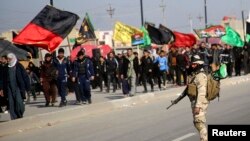TIKRIT —
At least 20 people were killed in a spate of attacks across Iraq on Monday that included the seizure by gunmen of a television station, the targeting of Shi'ite Muslim pilgrims and a desert offensive by the army.
Two years after the withdrawal of U.S. troops from Iraq, violence is at its highest levels since the sectarian bloodshed of 2006-7, when tens of thousands of people were killed.
Al-Qaida-linked Sunni militants have recently stepped up attacks on Iraqi security forces, civilians and anyone seen as supporting the Shi'ite-led government of Prime Minister Nuri al-Maliki.
In the northern city of Tikrit, four gunmen wearing explosive vests seized the building of the local government channel Salahuddin after detonating a parked car bomb near the entrance, police sources said.
Security forces retook the building after killing the militants in a firefight.
“Two of the attackers blew themselves up when security forces raided the station and the others were killed in the clashes before they managed to detonate the explosive vests they were wearing,” a senior police officer told Reuters.
The militants killed four employees of the station, including a female presenter, a program director and a news editor, the police sources said.
“Iron hammer"
In a desert region of the Sunni-dominated western Anbar province, the Iraqi military launched an operation against militants a day after at least 18 soldiers including a division commander were killed in the area.
The operation - codenamed “Iron Hammer” - was being carried out “to avenge the martyr Mohammed al-Kurwi”, Maliki said in a statement, referring to the commander of the army's Seventh Division, who was killed in the attack.
Islamist militants had targeted the commander over his role in a raid on a Sunni protest camp in April.
Military officials described the operation as the largest launched by Iraqi forces since U.S. troops withdrew and said they had killed at least 20 militants and had taken control of several areas so far.
It was not possible to independently verify the reports.
Separately, the Iraqi capital was hit by a string of bombings and shootings.
In eastern Baghdad, gunmen opened fire on a bus ferrying Shi'ite pilgrims to the city of Karbala south of the capital to mark the holy Shi'ite day of Arbaeen on Tuesday, killing two people and wounding three, police said.
A further three people were killed and eight wounded when a roadside bomb went off in a commercial street in the Tobchi district of northern Baghdad.
Gunmen using silenced weapons shot dead four people in a mainly Sunni district of southern Baghdad and three Iraqi soldiers were killed by a roadside bomb in the western outskirt of Abu Ghraib, police said.
Two years after the withdrawal of U.S. troops from Iraq, violence is at its highest levels since the sectarian bloodshed of 2006-7, when tens of thousands of people were killed.
Al-Qaida-linked Sunni militants have recently stepped up attacks on Iraqi security forces, civilians and anyone seen as supporting the Shi'ite-led government of Prime Minister Nuri al-Maliki.
In the northern city of Tikrit, four gunmen wearing explosive vests seized the building of the local government channel Salahuddin after detonating a parked car bomb near the entrance, police sources said.
Security forces retook the building after killing the militants in a firefight.
“Two of the attackers blew themselves up when security forces raided the station and the others were killed in the clashes before they managed to detonate the explosive vests they were wearing,” a senior police officer told Reuters.
The militants killed four employees of the station, including a female presenter, a program director and a news editor, the police sources said.
“Iron hammer"
In a desert region of the Sunni-dominated western Anbar province, the Iraqi military launched an operation against militants a day after at least 18 soldiers including a division commander were killed in the area.
The operation - codenamed “Iron Hammer” - was being carried out “to avenge the martyr Mohammed al-Kurwi”, Maliki said in a statement, referring to the commander of the army's Seventh Division, who was killed in the attack.
Islamist militants had targeted the commander over his role in a raid on a Sunni protest camp in April.
Military officials described the operation as the largest launched by Iraqi forces since U.S. troops withdrew and said they had killed at least 20 militants and had taken control of several areas so far.
It was not possible to independently verify the reports.
Separately, the Iraqi capital was hit by a string of bombings and shootings.
In eastern Baghdad, gunmen opened fire on a bus ferrying Shi'ite pilgrims to the city of Karbala south of the capital to mark the holy Shi'ite day of Arbaeen on Tuesday, killing two people and wounding three, police said.
A further three people were killed and eight wounded when a roadside bomb went off in a commercial street in the Tobchi district of northern Baghdad.
Gunmen using silenced weapons shot dead four people in a mainly Sunni district of southern Baghdad and three Iraqi soldiers were killed by a roadside bomb in the western outskirt of Abu Ghraib, police said.





